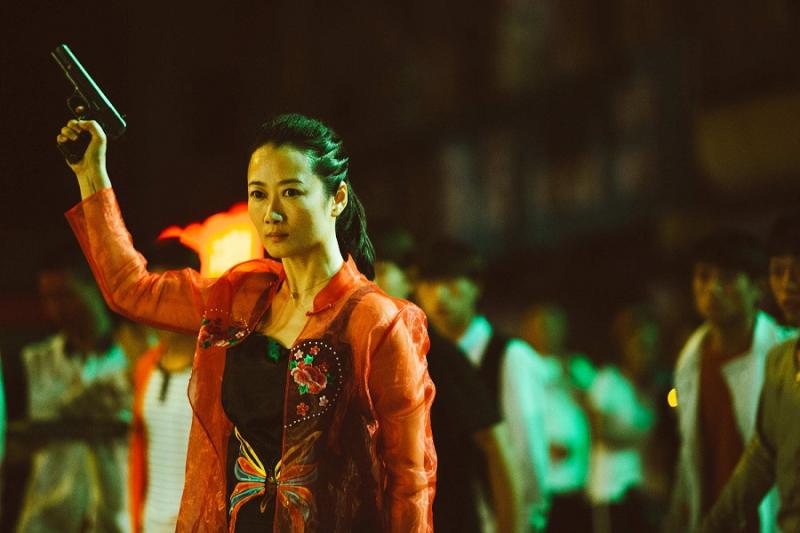DVD/Blu-ray: Ash Is Purest White | reviews, news & interviews
DVD/Blu-ray: Ash Is Purest White
DVD/Blu-ray: Ash Is Purest White
Love in a gangster milieu, set against the changes of the Chinese century

Chinese director Jia Zhangke has made a masterful career from following the changes that his native land has undergone in the 21st century, catching the speed of its transition from old ideological order to the relentless dynamism of subsequent economic development – and, most importantly, the human consequences of
Ash Is Purest White is set in China’s jianghu criminal underworld, that loosely clan-based structure that revolves, we learn early on, around concepts such as loyalty and righteousness – both factors, whether adhered to or broken, resound through the story (it certainly reflects tropes of Hong Kong gangster movies, too). The film opens in 2001 Datong, a depressed mining town in northern Shanxi province, where Liao plays local crime boss Bin, who’s dynamically partnered by Zhao's character Qiao, her power and poise a definite exception in this otherwise male-dominated world. They run various kind of entertainment facilities, all of a certain shabbiness – there’s a lovely early disco scene where Village People tracks get the dancefloor heaving – but turf warfare encroaches on Bin’s position, culminating in a decisive scene of captivatingly staged violence.
 When Qiao takes that rap, she goes down for five years. By the time she’s out of prison, the world has moved on – yesterday’s petty criminals are fronting respectable-looking corporations – and so, ignoring his past loyalties, has Bin. With the action moving to the Three Gorges, a location itself also set for drastic change with the damming of the Yangtze, Qiao adapts to new circumstances in her own ways, with scenes that reveal Jia’s acute awareness of social issues in the uneasy “New China” world that he depicts. (Cheated herself, Qiao quickly learns to cheat, one such ploy being to approach prosperous-looking men at family occasions with the words, “I’m her elder sister, she’s had a miscarriage”, certain that before long she will hit on one who feels guilty about a mistress.)
When Qiao takes that rap, she goes down for five years. By the time she’s out of prison, the world has moved on – yesterday’s petty criminals are fronting respectable-looking corporations – and so, ignoring his past loyalties, has Bin. With the action moving to the Three Gorges, a location itself also set for drastic change with the damming of the Yangtze, Qiao adapts to new circumstances in her own ways, with scenes that reveal Jia’s acute awareness of social issues in the uneasy “New China” world that he depicts. (Cheated herself, Qiao quickly learns to cheat, one such ploy being to approach prosperous-looking men at family occasions with the words, “I’m her elder sister, she’s had a miscarriage”, certain that before long she will hit on one who feels guilty about a mistress.)
But the wider dynamic here involves Qiao’s attempts to place herself anew in this changing world, one in which skill of impersonation may be more effective than any actual conviction. The fact that Jia sticks with trains to give a sense of the scale of her journey is a nice touch grounded in realism, though he’s not averse to including elements of fantasy. Finally, and perhaps unexpectedly for this narrative, he brings the film's closing scenes back to the world in which the film began, the difference of circumstances highlighting what has changed, for an allusive, melancholy coda.
There are moments when it has the feel of a fable, with Jia’s richly filmic style evident throughout, backed up by some tremendous cinematography, including use of different cameras and stylised colouring to reflect the different periods, from French DP Eric Gautier. Despite our sense of the wider sweep of history, this is an unusual love story that remains intimate to the end, its title alluding to the purity of volcanic ash as coming from its having, like love, burned at the highest temperature. The redolent sadness of Ash Is Purest White is that in this world of transition, such love brings little or no happiness and, while the loyalty and righteousness of the jianghu spirit offers consolation, it’s of a scant kind. Jia’s attainment of such a perspective on the world that has surrounded him through life is both highly accomplished and finally moving.
Below: watch the trailer for Ash Is Purest White
rating
Share this article
The future of Arts Journalism
You can stop theartsdesk.com closing!
We urgently need financing to survive. Our fundraising drive has thus far raised £49,000 but we need to reach £100,000 or we will be forced to close. Please contribute here: https://gofund.me/c3f6033d
And if you can forward this information to anyone who might assist, we’d be grateful.

Subscribe to theartsdesk.com
Thank you for continuing to read our work on theartsdesk.com. For unlimited access to every article in its entirety, including our archive of more than 15,000 pieces, we're asking for £5 per month or £40 per year. We feel it's a very good deal, and hope you do too.
To take a subscription now simply click here.
And if you're looking for that extra gift for a friend or family member, why not treat them to a theartsdesk.com gift subscription?
more Film
 London Film Festival 2025 - a Korean masterclass in black comedy and a Camus classic effectively realised
New films from Park Chan-wook, Gianfranco Rosi, François Ozon, Ildikó Enyedi and more
London Film Festival 2025 - a Korean masterclass in black comedy and a Camus classic effectively realised
New films from Park Chan-wook, Gianfranco Rosi, François Ozon, Ildikó Enyedi and more
 After the Hunt review - muddled #MeToo provocation
Julia Roberts excels despite misfiring drama
After the Hunt review - muddled #MeToo provocation
Julia Roberts excels despite misfiring drama
 London Film Festival 2025 - Bradley Cooper channels John Bishop, the Boss goes to Nebraska, and a French pandemic
... not to mention Kristen Stewart's directing debut and a punchy prison drama
London Film Festival 2025 - Bradley Cooper channels John Bishop, the Boss goes to Nebraska, and a French pandemic
... not to mention Kristen Stewart's directing debut and a punchy prison drama
 Ballad of a Small Player review - Colin Farrell's all in as a gambler down on his luck
Conclave director Edward Berger swaps the Vatican for Asia's sin city
Ballad of a Small Player review - Colin Farrell's all in as a gambler down on his luck
Conclave director Edward Berger swaps the Vatican for Asia's sin city
 London Film Festival 2025 - from paranoia in Brazil and Iran, to light relief in New York and Tuscany
'Jay Kelly' disappoints, 'It Was Just an Accident' doesn't
London Film Festival 2025 - from paranoia in Brazil and Iran, to light relief in New York and Tuscany
'Jay Kelly' disappoints, 'It Was Just an Accident' doesn't
 Iron Ladies review - working-class heroines of the Miners' Strike
Documentary salutes the staunch women who fought Thatcher's pit closures
Iron Ladies review - working-class heroines of the Miners' Strike
Documentary salutes the staunch women who fought Thatcher's pit closures
 Blu-ray: The Man in the White Suit
Ealing Studios' prescient black comedy, as sharp as ever
Blu-ray: The Man in the White Suit
Ealing Studios' prescient black comedy, as sharp as ever
 The Woman in Cabin 10 review - Scandi noir meets Agatha Christie on a superyacht
Reason goes overboard on a seagoing mystery thriller
The Woman in Cabin 10 review - Scandi noir meets Agatha Christie on a superyacht
Reason goes overboard on a seagoing mystery thriller
 London Film Festival 2025 - crime, punishment, pop stars and shrinks
Daniel Craig investigates, Jodie Foster speaks French and Colin Farrell has a gambling habit
London Film Festival 2025 - crime, punishment, pop stars and shrinks
Daniel Craig investigates, Jodie Foster speaks French and Colin Farrell has a gambling habit
 I Swear review - taking stock of Tourette's
A sharp and moving tale of cuss-words and tics
I Swear review - taking stock of Tourette's
A sharp and moving tale of cuss-words and tics
 A House of Dynamite review - the final countdown
Kathryn Bigelow's cautionary tale sets the nuclear clock ticking again
A House of Dynamite review - the final countdown
Kathryn Bigelow's cautionary tale sets the nuclear clock ticking again

Add comment